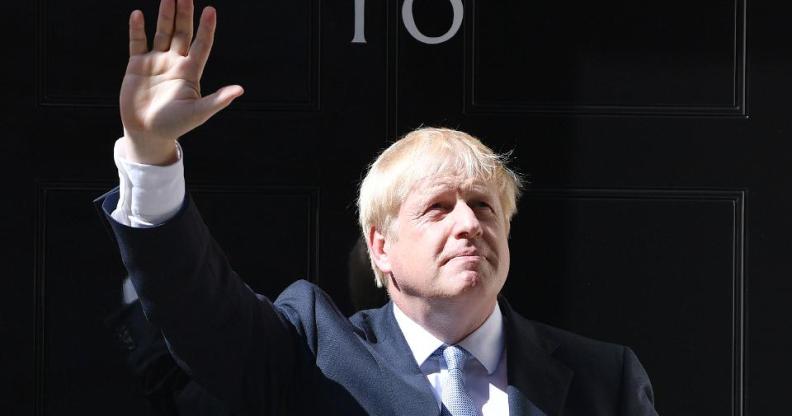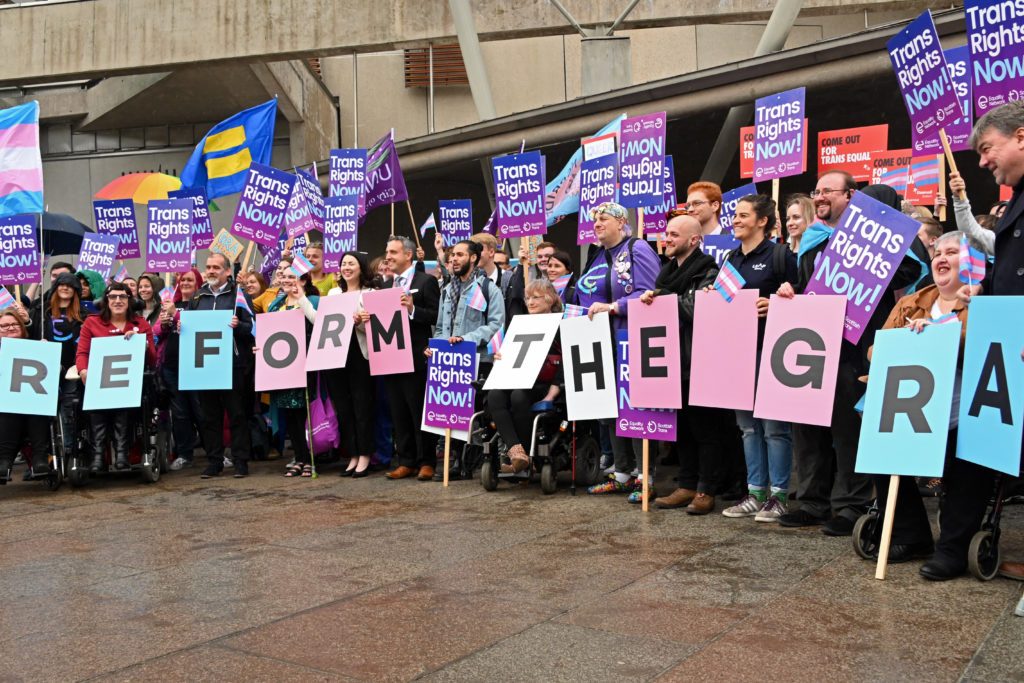Number 10 accused of trying to ‘weaponise’ transgender rights in an upcoming election

The UK’s new Prime Minister, Boris Johnson (Getty)
Number 10 Downing Street has been accused of engaging in Trump-like tactics by testing how “culture war” issues like transgender rights can be weaponised in northern Labour-voting towns.
On Monday, September 2, an insider source revealed to The Times that the government has been polling on divisive issues, including trans rights, to test whether they can be used to win votes in northern working-class constituencies.
The article notes that “weaponising” these issues would only “reinforce the Tories’ reputation among metropolitan liberals as the ‘nasty party'” — and LGBT+ advocates raised serious concerns about the impact on at-risk minorities.
“No 10 has been polling culture war issues, such as transgender rights, to see whether they can be weaponised against Labour in northern working-class constituencies”
This is reprehensible. Trans people are not pawns in a some twisted political game. https://t.co/0vyM4tazwz
— Lewis Addlington-Lee (@Lewis_ALee) September 2, 2019
Trans ppl MUST not be used to divide communities for the benefit of a bigoted party, determined to wage a culture war against minorities. Trans are at risk enough ffs. Last year my partner & I were beaten black & blue by right wing thugs. How *dare* they further endanger us? https://t.co/TK7TubhbZA
— Jennie Bujold ??♀️?️? (@JennieBujold) September 2, 2019
Cummings loves a bit of culture war, this was his whole thing in vote leave with the turkey immigration line. This stuff is going to be horrible and nasty and will endanger people’s lives. Trans rights, migrants rights, women’s rights are not your culture war play thing https://t.co/vbOFWs7ZRp
— Sabrina Huck (@Sabrina_Huck) September 2, 2019
One trans woman tweeted: “My life is not some political token to be tossed about by right-wing reprobates seeking re-election. IT’S MY LIFE.”
I am a trans woman.
I have friends and family and worries. My life is not some political token to be tossed about by right-wing reprobates seeking re-election.IT’S MY LIFE.
— ?️⚧️ VƎX is Trans ?️⚧️ (@vexwerewolf) September 2, 2019
According to BBC economics editor Faisal Islam, Number 10 has denied the allegations in The Times article and said they have been doing “no such thing”.
But critics have pointed to the recent hiring of ‘anti-trans’ journalist Andrew Gilligan as a Number 10 advisor, suggesting that claims of the government’s latest strategy may have merit.
Conservatives on transgender issues.
When Theresa May stepped down as prime minister earlier this year she left a complex legacy on LGBT+ issues and an inflamed discourse over transgender rights.
She brought transgender issues into the political playing field with a public consultation on the Gender Recognition Act (GRA) in 2018. It’s hoped planned reforms will uphold and improve rights for UK trans and non-binary people.

Protesters demonstrate outside the Scottish Parliament for reform of the Gender Recognition Act (Ken Jack/Getty)
But her government repeatedly delayed its response to the consultation, giving rise to what Labour MP Dawn Butler called a “hostile environment” for trans people in the UK.
Butler said the Tories’ stalling on reforms was a “f**king disgrace” as it led to trans issues being unnecessarily scrutinised by the media.
“Within that 18 months of them slowing down, they left a void, so that void was filled with hate, misconceptions, misrepresentation… all of that.
“What happened in that void of the government rolling back is that transgender people began to feel the hate and discrimination that they hadn’t felt in a long time.”
This growing climate of ‘hate and discrimination’ makes the alleged polling on transgender issues particularly harmful as it risks provoking the debate further.
The transgender community is already suffering an unprecedented amount of hate via UK transphobic hate groups & the UK Media (like The Times) & now Boris & his clan want to leverage their suffering for more power? There aren’t enough ways to express how heinous the tories are.
— Izzy Rizinti ?️? (@BellaRizinti) September 2, 2019
Before becoming Conservative leader, Johnson spoke of his commitment to LGBT+ equality, saying: “We must do more to ensure that trans rights are protected and those who identify as trans or intersex are able to live their lives with dignity.”
But in July he elected what Labour called ‘the most anti-human rights’ cabinet in decades, of which nearly a third voted against same-sex marriage.
While Brexit will inevitably be the focus of the anticipated general election, the response to The Times article indicates a significant fear among the LGBT+ community that transgender issues could be brought further into the spotlight.

